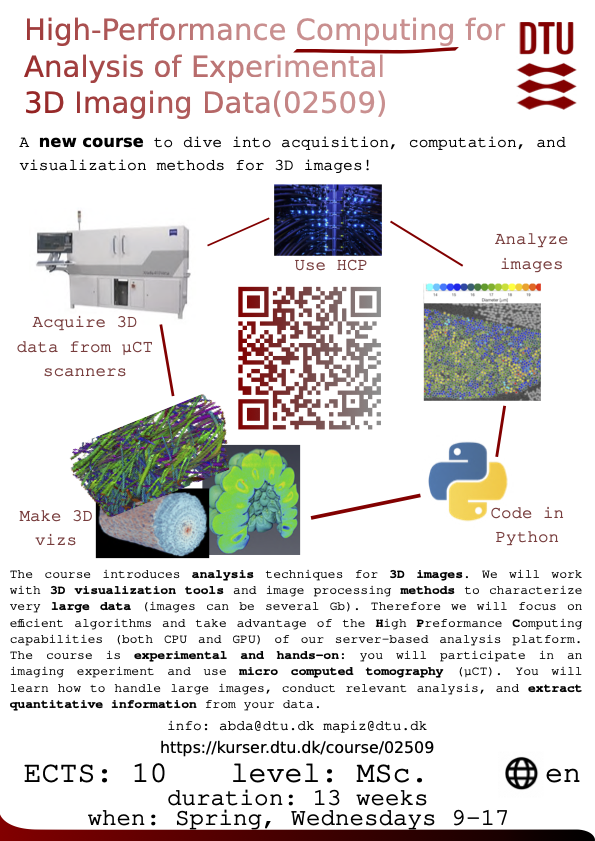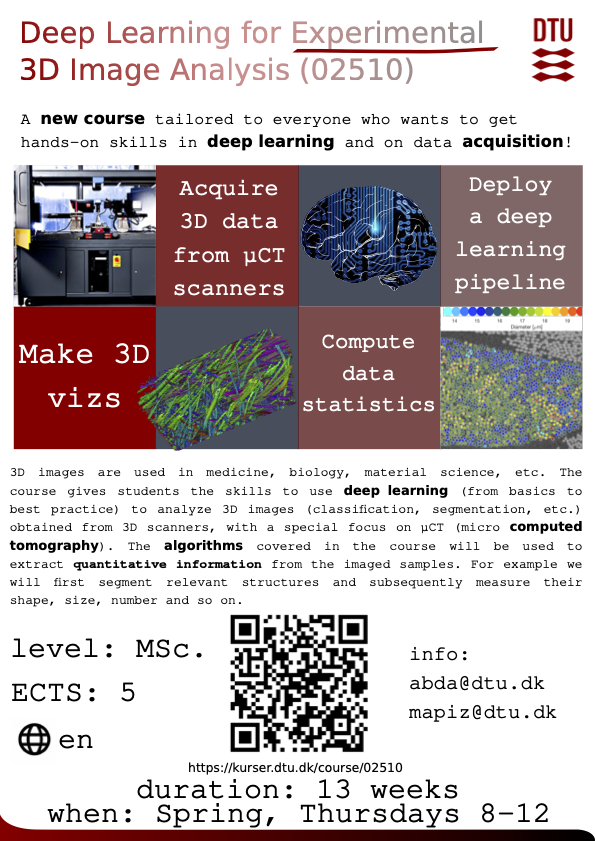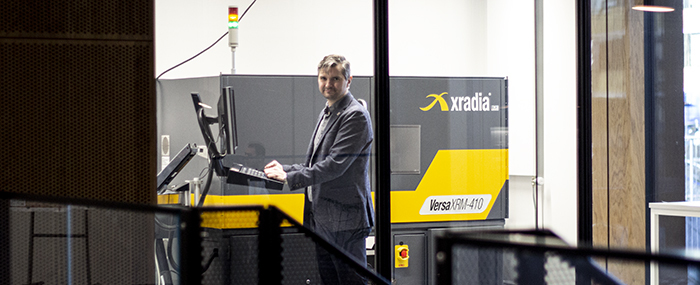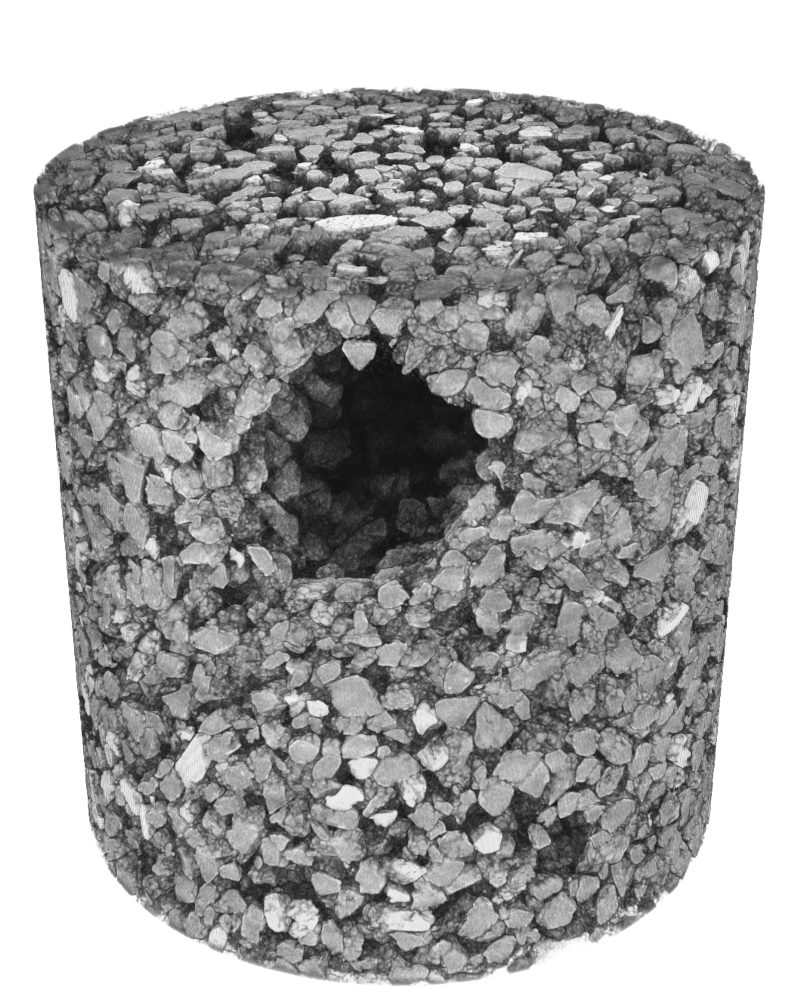High-Performance Computing for Analysis of Experimental 3D Imaging Data
DTU course 02509

A new course starting in Spring 2023
If you want to carry out 3D imaging and analyze the acquired images using advanced visualization and analysis methods, this course is for you!
In this course, you will work with 3D µCT imaging and analysis of 3D images. This imaging technique is particularly useful if you want to investigate the internal structure of a material on a microscopic level without destroying the sample you are imaging. You can use this in a wide range of areas from medicine to materials research. To use 3D imaging you need to combine knowledge from three areas, including image acquisition, image analysis, and knowledge of the sample you are studying.
In this course, you will get the skills that will enable you to use 3D imaging as a research tool. You will work with experimental imaging using 3D μCT from laboratory scanners and we plan a beam time visit to the MAX IV synchrotron in Lund. MAX IV is a new world-class research facility that offers unique opportunities within 3D imaging.
The most difficult, but also fun and rewarding part of 3D imaging, is analyzing the images. In this course, you will get the practical skills to carry out advanced visualization and analysis, and you do not need to have worked with image analysis before. You will also be introduced to high-performance computing that is needed for analyzing large 3D images.

Learning objectives
A student who has met the objectives of the course will be able to:
- carry out experimental 3D imaging including preparing samples, scanning, retrieving data, and reconstructing a 3D volume,
- assess when µCT laboratory scanners and synchrotron CT imaging can be used,
- plan image analysis pipelines for volumetric 3D images,
- select the appropriate 3D visualization methods and tools to inspect 3D images,
- implement basic analysis methods for image processing and segmentation of 3D images using Python,
- use a high-performance computing system and utilize CPU, GPU, caches, and memory,
- select and apply appropriate methods for high-performance image analysis and use parallel calculations when appropriate,
- perform efficient calculations on a shared analysis platform,
- use the obtained skills to carry out a small research project.
Content
You will learn the core skills necessary for using 3D imaging including setting up scans, writing code, using software tools, and experimenting with data.
During the hands-on experiments with 3D imaging, you will learn how to prepare and mount samples for 3D scanning and set the scanner parameters. You will also learn methods for reconstructing and analyzing the acquired images. This includes visualization methods, image processing, and analysis techniques such as filtering, image morphology, and segmentation, and you will learn to compute statistics of the shape and size of imaged structures.
3D images are often very large, and a single image can be several Gb, making data handling and processing challenging on a normal PC. Therefore, you will learn to use high-performance computing systems that enable the processing of large amounts of data using the G databar as a shared platform where both CPU and GPU processing units are available. You will also learn analysis strategies that will ensure efficient image analysis, where algorithms are first tested on small volumes and later scaled up.
Through the course, you will gain the basis for working with 3D imaging as a tool, and you will gain prerequisites for working further within 3D imaging, image analysis, and/or high-performance computing.
Two courses in Experimental 3D Image Analysis



The other new course in experimental 3D image analysis
In parallel to this course (with focus on image analysis, high performance computing, and experiments), there is another new course, ‘02510 Deep Learning for Experimental 3D Image Analysis’, which will give you skills to analyze large 3D images using deep learning. It is possible, and advantageous, to follow both courses.
There is a need for expertise in experimental 3D imaging, and the skills you will learn in the two courses are in high demand in industry and research.

Course information
- Point (ECTS): 10
- Type: MSc
- When: Spring Wednesday 8-17 (F5A and F5B), 13-weeks period
- Where: Lyngby
- Exam: Oral examination
- Evaluation: 7 step scale
- Prerequisites: None, None, but having worked with image or other data analysis is an advantage/li>

Course Responsibles
- Anders Bjorholm Dahl, abda@dtu.dk
- Marco Pizzolato, mapiz@dtu.dk

3D µCT scan of a concrete sample
